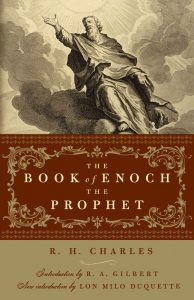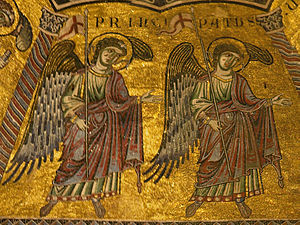Posts in this series:
-
- Are the “Rulers of the Age” in 1 Cor. 2:6-8 Human or Spiritual? – the sea change
- Who Killed Christ? Human rulers and/or angelic rulers. Addressing 1 Cor 2:6-8.
- Who Crucified Jesus – Men or Demons? Continuing Miller’s Study of 1 Cor 2:6-8
- What they used to say about Paul’s “rulers of this age” who crucified the “lord of glory”
- Seven problems for the view that Paul’s “rulers of this age” were human authorities
- More older arguments for Paul’s “rulers of this age” being spirit powers
–o0o–
 Paul foresees the crushing of every spiritual ruler who has been against God in 1 Corinthians 15:24-26
Paul foresees the crushing of every spiritual ruler who has been against God in 1 Corinthians 15:24-26
24 Then the end will come, when he hands over the kingdom to God the Father after he has destroyed every ruler (ἀρχὴν), every authority (ἐξουσίαν) and power (δύναμιν). 25 For he must reign until he has put all his enemies under his feet. 26 The last enemy to be destroyed is Death.
But where did he get that idea? Matthew Black has proposed that there was an early Christian “meme” (as we might say today) — more correctly a “pesher” or “interpretation” — that combined Psalm 110:1 with Daniel 7:13ff.
Psalm 110:1
The Lord says to my lord:
“Sit at my right hand
until I make your enemies
a footstool for your feet.”
Daniel 7:13-14, 27
“In my vision at night I looked, and there before me was one like a son of man, coming with the clouds of heaven. He approached the Ancient of Days and was led into his presence. 14 He was given authority, glory and sovereign power; all nations and peoples of every language worshiped him. His dominion is an everlasting dominion that will not pass away, and his kingdom is one that will never be destroyed. . . . 27 Then the sovereignty, power and greatness of all the kingdoms under heaven will be handed over to the holy people of the Most High. His kingdom will be an everlasting kingdom, and all rulers will worship and obey him.’
Compare Mark 14:62 where these two passages are again intertwined:
62 “I am,” said Jesus. “And you will see the Son of Man sitting at the right hand of the Mighty One and coming on the clouds of heaven.”
Who are these rulers in Paul’s letters to the Corinthians? If we interpret Paul’s words in the context of related documents in that general time period we are likely to conclude they are angelic rulers. Notice:
Ephesians 1:20-21
That power is the same as the mighty strength 20 he exerted when he raised Christ from the dead and seated him at his right hand in the heavenly realms, 21 far above all rule and authority, power and dominion, and every name that is invoked, not only in the present age but also in the one to come. 22 And God placed all things under his feet. . .
Those powers over whom Christ rules appear to be in the heavenly places.
1 Peter 3:22
Jesus Christ, 22 who has gone into heaven and is at God’s right hand—with angels, authorities and powers in submission to him.
That surely seals it. Yes, the angels and authorities and powers in those heavens are all subject to him.
Guy Williams in his published thesis comments
So, then, this forms an early Christian (perhaps, ‘mythical’) narrative. Certain angelic powers are assumed somehow to have become estranged from and hostile towards God, thus making their eventual defeat a part of the new Christian message. (p. 134)
So we come to the last name listed by Robert Ewusie Moses to represent the “immense” “scholarly literature” favouring the position that the rulers of this age in 1 Corinthians 2:6-8 are in fact spiritual, not human, powers.
Guy Williams, 2009
Williams, Guy. 2009. The Spirit World in the Letters of Paul the Apostle: A Critical Examination of the Role of Spiritual Beings in the Authentic Pauline Epistles. Göttingen: Vandenhoeck & Ruprecht.

We are moving well beyond the “what they used to say” era but I include Williams’ viewpoint here because it is the last cited by Robert Ewusie Moses of the “immense” “scholarly literature” favouring the position that the rulers of this age are spiritual powers.
Williams summarizes five reasons for viewing the rulers of this age as “angelic and spiritual rulers”, not human powers, “although the influence of human powers is not unrelated to this idea.” (p. 136)
(a) it is the earliest known interpretation of these verses, [Ignatius (Eph 18-19); Marcion (Tertullian, Marc 5.6.5) and Ascension of Isaiah (11:24)]
(b) the verb used here (καταργέω – meaning ‘destroy’, ‘nullify’) refers to the destruction of angelic ἀρχαὶ by Christ in 15.24 – a highly suggestive parallel,
(c) the rulers are ignorant of the wisdom which God “established before the ages“ – a point of some relevance to immortal angels, but meaningless in connection with humans,
(d) the rulers are presently being destroyed, an assertion which might fit with angelic rulers but not with Herod and Pilate, who died long before Paul’s letter was written, and
(e) Paul writes specifically of “the rulers of this age“, suggesting a narrative of cosmic conflict between certain powers of evil and Christ (cf Gal 1.4; 2Cor 4.4; also Eph 2.2; Ascen. Isa. 2.4). In early Christian tradition, the ‘current age’ is most commonly associated with the rule of Satan and his subordinates.
These arguments suggest that this text is similar in scope to 1 Cor 15.24 and Col 2.15.
(p. 137, my formatting and bolding; italics original)
Continue reading “Once more on the “Spiritual Rulers” in Paul’s Cosmic Drama”









